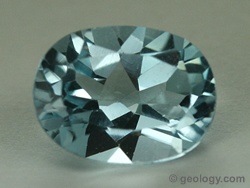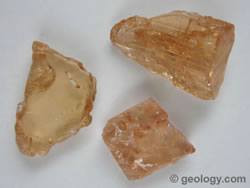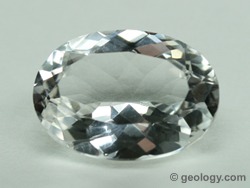المدير العام
المدير العام


عدد المساهمات : 1713
السٌّمعَة : 1
تاريخ التسجيل : 26/08/2011
 | |  Topaz Mineral Uses & Properties Topaz Mineral Uses & Properties | |
Topaz
Mineral Uses & Properties Topaz is a silicate mineral most often found in igneous rocks of felsic
composition. It is also found in some hydrothermal veins and
the hydrothermally altered rocks that surround them. It
is a common mineral of pegmatites and also found in the cavities
of rhyolite and granite. Rarely, topaz is found in metamorphic rocks
such as schist or quartzite. Topaz is not an abundant mineral but
occurs worldwide in the types of rocks listed above.
Compared to other minerals, topaz is relatively resistant to weathering
and stream abrasion. These characteristics enable it to be found
in the stream sediments derived from the weathering of topaz-bearing rocks.
It is sometimes produced by placer mining.
Topaz Gemstones
Topaz is a very popular gemstone. Gem quality topaz
most commonly occurs in nature as a colorless crystal. When cut as a gemstone
these colorless specimens generally have the lowest value. A significant
amount of natural topaz also occurs in a color range spanning from yellow to brown.
Small amounts of natural blue and pink topaz are found but the abundance of natural stones in these colors is very low.
Treated Topaz Gemstones
Blue topaz is a very popular gemstone but this color is rarely
found in nature. To produce blue topaz, some dealers irradiate
clear topaz then heat it to produce a blue gemstone. The
most desirable blue topaz stones have a color that resembles
aquamarine. Today, most of the blue topaz
being sold as a gemstone has been treated. Dealers should label these
stones as "treated" or "enhanced" so that
customers know the stone's history. The price of blue topaz has
declined in recent years because so much blue topaz has
been produced through treatment.
A small amount of topaz occurs naturally as pink and red crystals.
These are the most expensive colors of natural topaz. However,
brown topaz can sometimes be heat treated to produce a pink stone.
Two other colors of topaz are seen in the gemstone market. One
is a green topaz that has been produced by diffusing chromium into
the outer surface of the stone. Another treated stone is sold under
the name "mystic" topaz. This is a stone with an iridescent appearance
that is produced by vapor coating the surface of clear topaz with titanium oxide.
This surface coating is not permanent and many mystic topaz gemstones quickly
show signs of wear.
Synthetic Topaz Gemstones
Some synthetic topaz is produced, cut and sold as gemstones.
It should be clearly labeled as "laboratory", "synthetic", "created"
or some other term to let the buyer know that it is not natural
material.
Anyone purchasing gemstones should be aware that treated and
synthetic gems exist and are sometimes sold without proper labels.
Topaz Hardness and Durability
Topaz is a very hard mineral. It is used for the standard hardness
of eight in the Mohs Hardness Scale. Some minerals of great hardness
can be broken rather easily. Topaz has a perfect basal cleavage making it vulnerable to breakage. This cleavage makes topaz a
somewhat fragile gemstone. It is best suited for pendants and
earrings that receive little hard use and less suited as a ring
stone that might be bumped while in use.
|  |

Blue faceted topaz. 1.40 carats, 9x6 mm, from Brazil. Topaz Photos |

Rough brown topaz crystal sections. |

Faceted pink "treated" topaz. 2.4 carats, 9x7mm, from Africa. Topaz Photos |

Faceted clear topaz. 6.25 carats, 14x10 mm, from Switzerland. Topaz Photos |

Synthetic blue faceted topaz. 12.05 carats, 14x11 mm, Russian made. Topaz Photos |
|
| |
|
